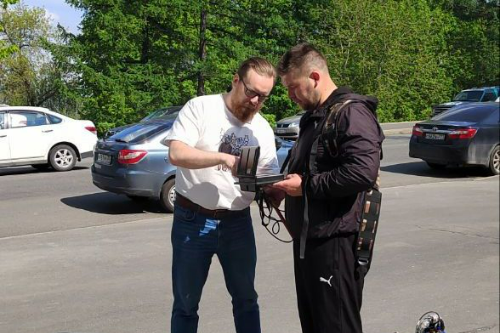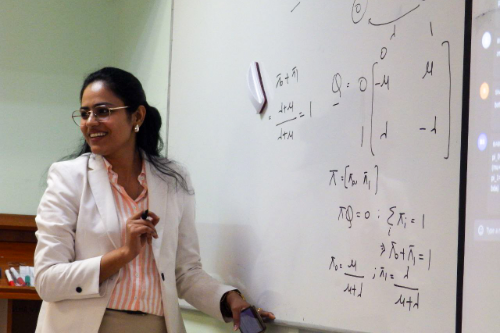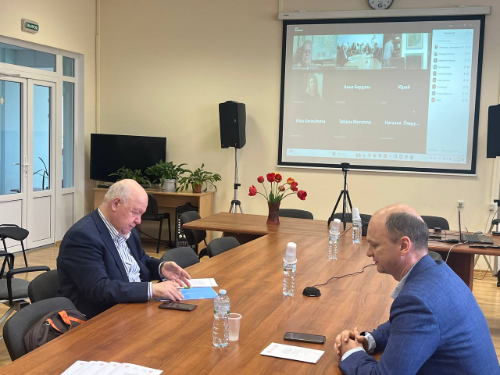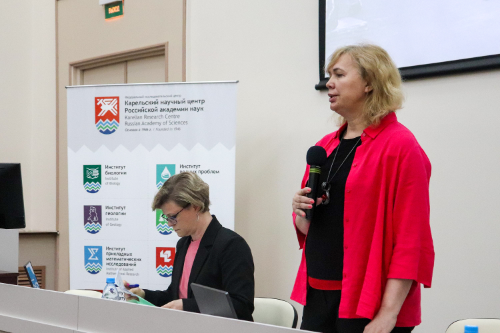Among the key achievements of the Academy of Sciences in the second half of the 20th – early 21st centuries Nikolai Filatov named the integrated atlases produced for Russia’s largest lakes (Baikal, Ladoga, Onego, Teletskoye, etc.), and participation of RAS scientists in the publication of encyclopedias on lakes and reservoirs of Russia and the world.
– The results of studies of Russian lakes by the Academy of Sciences have made an outstanding contribution to natural science, basic research, and to dealing with practical issues of our country's economy. The results are of significance for addressing the problems of the hydrology of inland waters and evolution of the biosphere, – concluded Nikolai Filatov.



Director General of the Karelian Research Center RAS, Corresponding Academician Olga Bakhmet remarked on the high significance of the lecture. The Director added that the lake studies carried out by the Northern Water Problems Institute KarRC RAS are also recognized at the world level. At the same time, members of the Learned Council admit that one of the main problems for further development of this scientific area in the republic is the recruitment of young specialists. It needs to be addressed in the nearest future, including through collaboration with specialized scientific organizations and universities of St. Petersburg.
The lecture of Dr. Sergey Svetov was devoted to one of the main research areas of the Institute of Geology KarRC RAS - petrological and paleovolcanological studies of the oldest rocks of the Earth's crust. Franz Levinson-Lessing, founder of the Russian petrography science school, academician of the St. Petersburg Academy of Sciences, was at their origins. He started his scientific career as a student of the St. Petersburg University, participating in expeditions to the Olonets Province headed by Professor Alexander Inostrantsev. The researcher's publications "On Yalguba Variolites" (1884) and "The Olonets Diabase Formation" (1888) were not merely an output of his work, but also laid the foundations of a new area in science - magmatic petrology.
Franz Levinson-Lessing was the first to substantiate the concept of petrographic formations, produced the first petrographic description of variolites, a rare rock species found, i.a., in Karelia, and the processes of magma liquation (differentiation), created a well-reasoned chemical classification of rocks (1898). This scholar is the author of the first Russian edition of the "Petrographic Dictionary" (1932) and a number of textbooks: "Introduction to Geology" (1925), "Petrography" (1925), and others. Also, Franz Levinson-Lessing was a student of Vasily Dokuchaev, the founder of soil science, participated in geology-and-soil surveys and made an invaluable contribution to the establishment of the Soil Institute in Russia.


Modern ideas about the geology of Karelia, which rest upon the foundation laid by Franz Levinson-Lessing, have been advanced by the team of the Institute of Geology KarRC RAS. In the second half of the 20th century, one of the leading research areas of Russian paleovolcanology - the science of ancient volcanism of the Earth (A.P. Svetov, A.I. Golubev), has formed in the Institute. Newly discovered in Karelia are spinifex textures in high-Mg volcanic rocks – komatiite basalts (V.S. Kulikov), the oldest (3.05-2.95 Ga) adakite association (S.A. Svetov). Nowadays, petrology is one of the key research areas for scientists of the Precambrian geology science school: L.P. Sviridenko, V.N. Kozhevnikov, O.I. Volodichev, A.I. Slabunov, V.I. Ivashchenko, A.V. Stepanova, etc.


In conclusion, Sergey Svetov used the example of Franz Levinson-Lessing's work to emphasize the importance of interdisciplinary studies, which give rise to new areas of research.
During the discussion following the lectures, Chief Researcher at the Institute of Biology KarRC RAS, Corresponding Academician Alexander Titov remarked it was necessary to continue the historical theme at meetings of the KarRC RAS Learned Council and recommended including them in the agenda for 2024-2025.
Wrapping up, Olga Bakhmet pointed out the importance of holding seminars and conferences to discuss methodological and other scientific issues, especially for young scientists. Sessions of the Learned Council have won the reputation as a platform for acquiring new knowledge. Science-to-practice seminars and methods workshops also serve this purpose. For example, the seminar "Integrated Development of Arctic Territories: an Expert Opinion" operates on a regular basis at KarRC RAS. Such events shape the scientist's outlook and are an opportunity to discuss the problem with the participation of leading experts from different scientific fields.











